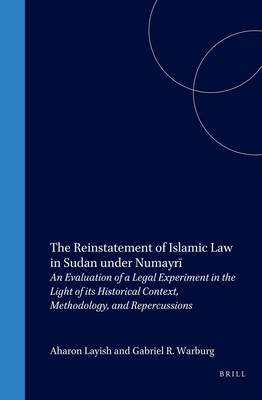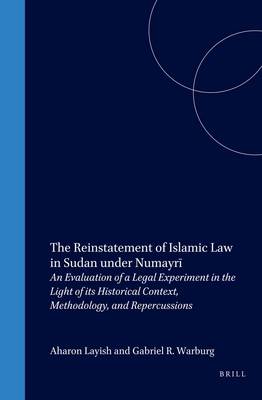
- Afhalen na 1 uur in een winkel met voorraad
- Gratis thuislevering in België vanaf € 30
- Ruim aanbod met 7 miljoen producten
- Afhalen na 1 uur in een winkel met voorraad
- Gratis thuislevering in België vanaf € 30
- Ruim aanbod met 7 miljoen producten
Zoeken
The Reinstatement of Islamic Law in Sudan Under Numayrī
An Evaluation of a Legal Experiment in the Light of Its Historical Context, Methodology, and Repercussions
Aharon Layish, Gabriel R Warburg
€ 308,45
+ 616 punten
Omschrijving
The present study examines President Ja'far Numayrī's experiment of reinstating Islamic law in the Sudan and the methods employed to this end, in the light of its historical context and sources of inspiration. Islamist legislation, legal circulars and judicial practice are here utilized as source material for the analysis of the methodology employed in Numayrī's experiment and its application with a view to evaluating their impact on the uncodified Islamic law, state control of public morals, and on Sudanese society and economy. The focus of attention here is the judge as an instrument for implementing the government's Islamist policy by means of expanded judicial discretion based on a synthesis of traditional Islamic and modern non-Islamic sources of law. The book is intended for Islamists, legal historians, and lawyers.
Specificaties
Betrokkenen
- Auteur(s):
- Uitgeverij:
Inhoud
- Aantal bladzijden:
- 350
- Taal:
- Engels
- Reeks:
- Reeksnummer:
- nr. 16
Eigenschappen
- Productcode (EAN):
- 9789004121041
- Verschijningsdatum:
- 15/07/2002
- Uitvoering:
- Hardcover
- Formaat:
- Genaaid
- Afmetingen:
- 165 mm x 243 mm
- Gewicht:
- 807 g

Alleen bij Standaard Boekhandel
+ 616 punten op je klantenkaart van Standaard Boekhandel
Beoordelingen
We publiceren alleen reviews die voldoen aan de voorwaarden voor reviews. Bekijk onze voorwaarden voor reviews.








